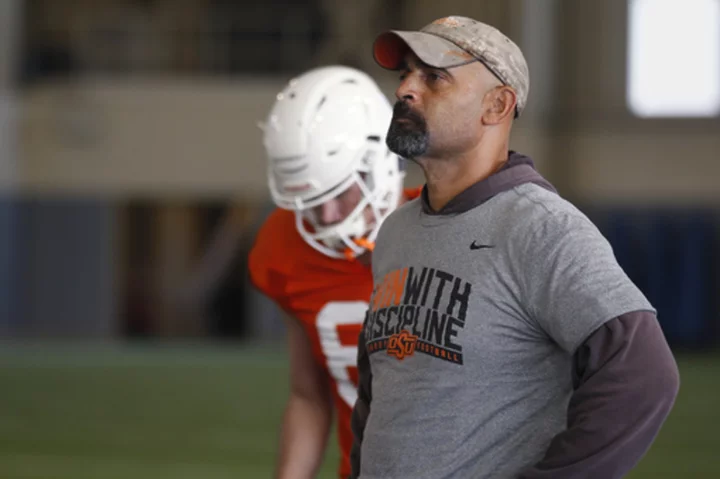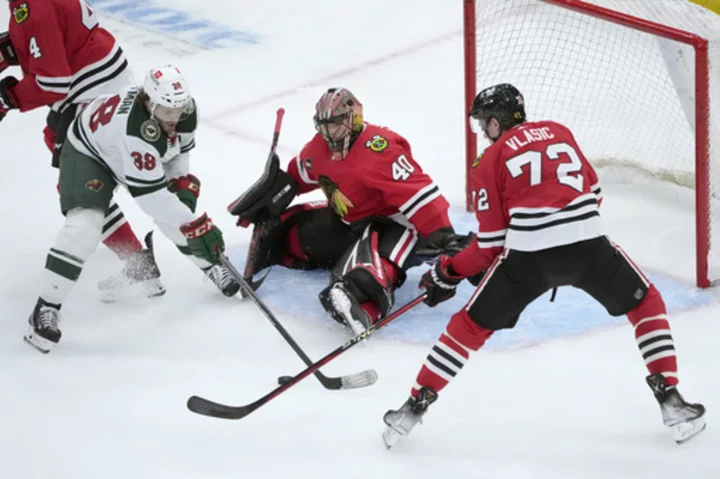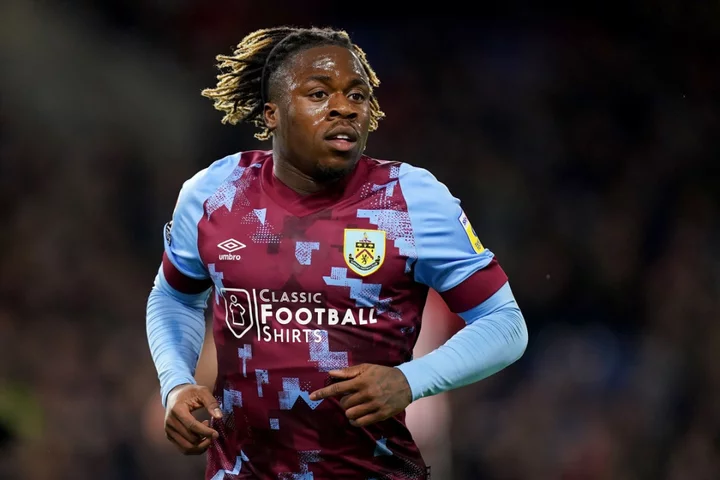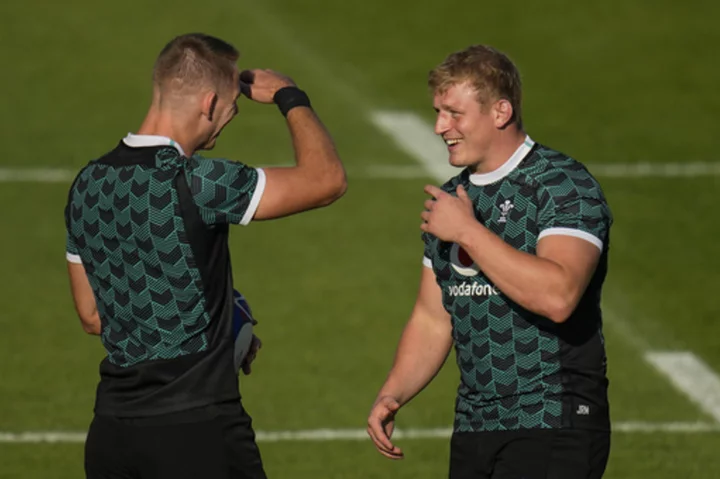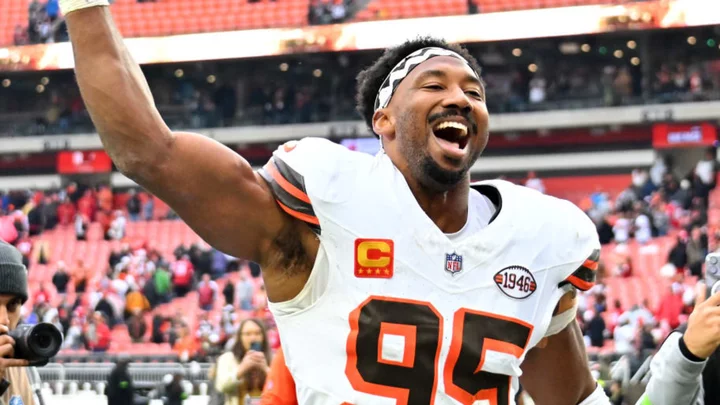Oklahoma State's Kasey Dunn has spent three decades as an assistant football coach, a career that spans nine schools, a couple of NFL teams, four positions and all three phases of the game.
It took Dunn almost 25 years to become an offensive coordinator, and he is now one of just seven Black coaches to hold that position at the 69 schools that play at the highest level of college football. That's 10% of the total in the Bowl Subdivision, where nearly half the players are Black.
“I don’t really notice it from the standpoint that, like, I’m carrying a torch or something," Dunn said. "But I do have the respect that if I don’t succeed, that’s going to hurt, I think, a little bit the next guy, you know?"
The dearth of Black coaches leading major college football programs routinely draws scrutiny. This season, 14 of 133 programs in Division I's top tier, including seven of 69 Power Five conference teams, will have a Black head coach.
Just as notable is how drastically under-represented African-Americans are among offensive coordinators, the job mostly likely to lead to a head-coaching gig.
The small number of Black offensive coordinators has ties to the quarterback position: If you haven't played quarterback or coached it, head coaches are less likely to put you in charge of running an offense. The issue is also similar to what stunts diversity at the head-coach level, experts say: The people in charge tend to hire people who look like them.
“The racial imbalance in college coaching really starts to intensify when you move from the position coaches, the assistants, to the coordinator level,” said Raj Kudchadkar, the executive director of the National Coalition of Minority Football Coaches.
Black players have made up the majority of those participating in major college football for at least a decade, according to NCAA data. Over the past 10 years, the percentage of white players in the Bowl Subdivision has been steadily declining as the percentage of minority players has increased. In 2022, the most recent year of data collected, 46% of players in Power Five conferences were Black; the figure is 52% in the so-called Group of Five conferences.
Coaching staffs on the whole are starting to look more like the rosters they coach. The percentage of Black and minority assistant coaches — not counting coordinators — has been on the rise from 2012-22 in FBS, and especially in the Power Five.
Since 2017, the majority of non-coordinator assistant coaches in the Atlantic Coast, Big Ten, Big 12, Pac-12 and Southeastern conferences have been minorities. In 2022, 46% of assistant coacheB at Power Five schools were Black, up from 36% in 2012.
Across all of FBS, assistants were 34% Black and 5% identifying as other minority groups in 2012. In 2022, Black coaches made up 44% of FBS assistants, with 9% other minorities.
That growth has not reached offensive coordinator. In 2012, about 9% of FBS coordinators were Black. In 2022, it was still under 10%, according to the NCAA.
“I want to make it clear: We don’t need to build a pipeline. There is already a pipeline of minority coaches on the offensive side of the ball,” Kudchadkar said. “Where we’re hitting that blockade is when we get to offensive coordinators.”
On the other side of the ball, Black coaches have made up more than 20% of the defensive coordinators in major college football from 2018-22.
The NCAA identifies any coach with coordinator in his title as a coordinator, which includes run-game or pass-game coordinators, which can inflate the total number of coordinators as well as the percentage who are minorities.
According to the AP's research, 132 coaches hold the title of offensive coordinator or co-coordinator in the FBS heading into this season. Nine are black (7%).
The Big 12, where Dunn coaches with Oklahoma State, has the most Black offensive coordinators of any conference this season with three, including two first-time coordinators.
West Virginia's Chad Scott, 48, is a former college running back who has coached that position for most of his career. Iowa State's Nate Scheelhaase, 32 and one of the youngest offensive coordinators in the Power Five, played quarterback for Illinois and will be coaching QBs for the first time for Cyclones head coach Matt Campbell, who is white.
“A key component for Black coaches in college football or in the NFL is the belief by somebody that probably doesn’t look like them,” Scheelhaase said.
It would help if it happened more often.
Kudchadkar cited a study that showed minority coaches are 30% more likely to hire other minority coaches to be coordinators.
Maryland coach Mike Locksley, who founded the minority coaches association three years ago, played defensive back and started his coaching career on defense before migrating to offense, eventually becoming a coordinator at Illinois under Ron Zook in 2005.
Locksley was tight ends coach when he first became a coordinator, but knew it would be important to work closely with quarterbacks. Now he also has quarterbacks coach on his lengthy resume.
He said that type of cross-training seems to be less frequent these days as staffs grow.
“This generation of coach kind of specializes,” he said.
Both of Locksley's coordinators this season are Black, including Josh Gattis, who rose to offensive coordinator through wide receivers coach and won the Broyles Award as the nation's top assistant while calling plays for Michigan in 2021.
Gattis spent one season at Miami in 2022. At Maryland, he will work primarily with quarterbacks for the first time in his career.
“It’s my job to develop these coaches and get them the skill set necessary to hopefully one day lead programs themselves,” Locksley said.
Dunn, who played receiver in college, has been receivers coach at Oklahoma State since 2011. He was elevated to OC in 2020 by head coach Mike Gundy. The 54-year-old Dunn said as the quarterback position continues to become more diverse that should put more Black coaches on the path to becoming coordinators.
“If you’re going to find more minorities that are coordinators on the offensive side of the ball, it's going to start there,” he said.
Scheelhaase could be part of the generation that closes the gap.
He was recruited by Locksley to Illinois as a player and still stays in touch. He said Gattis and Brian Johnson, the former Utah quarterback who is offensive coordinator for the Philadelphia Eagles, are among the veterans he has turned to for career advice.
“That's been super helpful for a guy in my shoes and a lot of guys like me,” he said.
Dunn said he typically doesn't go out of his way to connect with other Black offensive coordinators.
“But I’d be lying if I didn’t say I was rooting for them,” he said.
___
Follow Ralph D. Russo at https://twitter.com/ralphDrussoAP and listen at http://www.appodcasts.com
___
AP college football: https://apnews.com/hub/college-football and https://apnews.com/hub/ap-top-25-college-football-poll

